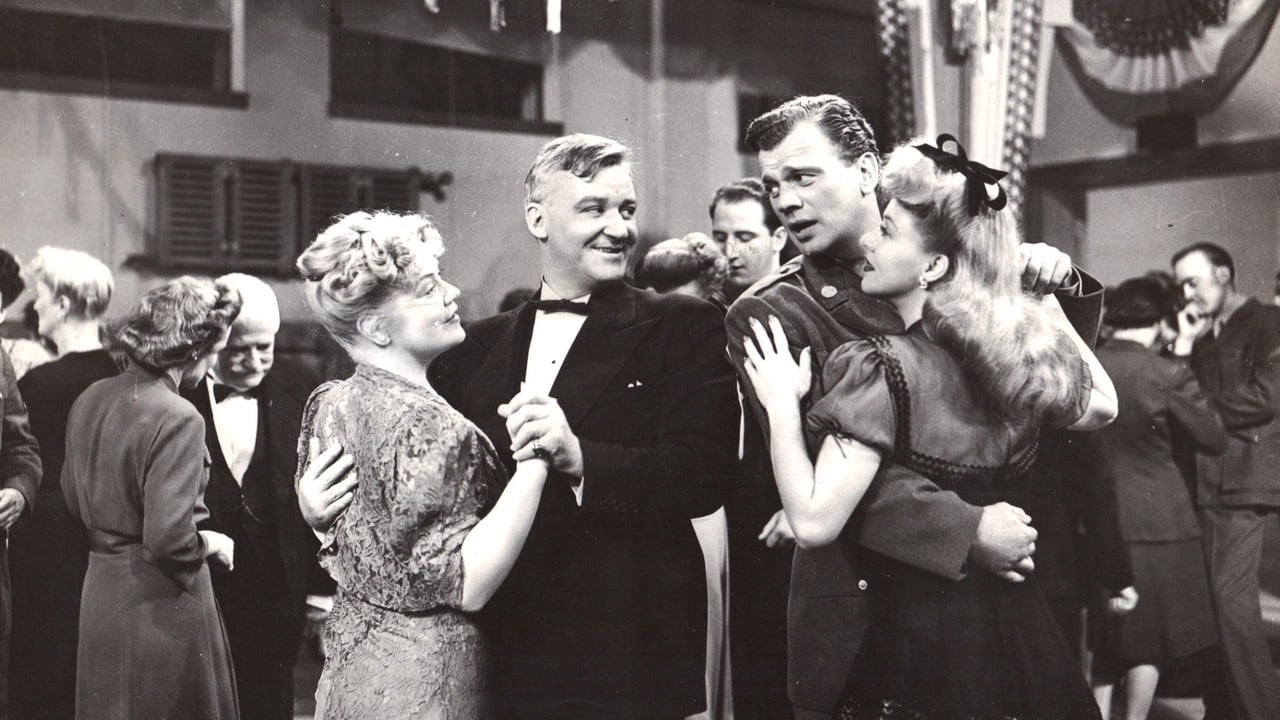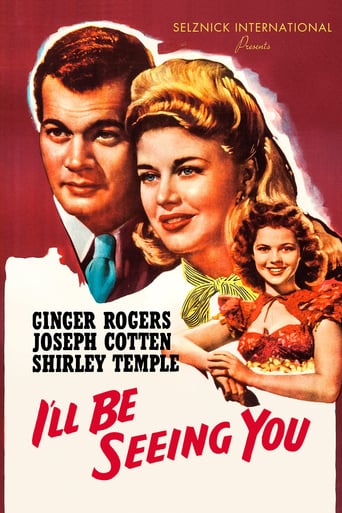Kattiera Nana
I think this is a new genre that they're all sort of working their way through it and haven't got all the kinks worked out yet but it's a genre that works for me.
Exoticalot
People are voting emotionally.
Robert Joyner
The plot isn't so bad, but the pace of storytelling is too slow which makes people bored. Certain moments are so obvious and unnecessary for the main plot. I would've fast-forwarded those moments if it was an online streaming. The ending looks like implying a sequel, not sure if this movie will get one
Walter Sloane
Mostly, the movie is committed to the value of a good time.
vert001
I'LL BE SEEING YOU's origin in a popular radio drama of the time is betrayed by its occasional and generally superfluous narration, and there are other minor flaws, but they do little to dampen an emotional impact that must have been especially poignant for its contemporary audiences. IBSY gives us the classic story of two wounded souls finding strength and healing in their love for one another. It centers on the psychological phenomenon called 'shell shock' during the First World War, 'battle fatigue' during the Second, 'psycho-neurosis' in the movie and 'ptsd' today. The terms become longer and the words more abstract, but the problem remains. The symptoms of severe stress don't necessarily go away once the stress is over. That a popular film would concern itself with this subject while in the midst of a great war is especially impressive.Still, I'LL BE SEEING YOU is a romance more than anything, almost accidentally set in the middle of a war. Joseph Cotton is a returning soldier just out of a psychiatric hospital to see if he's ready to return to normal life. Ginger Rogers is out of a prison on a temporary furlough (the charges seem quite shaky from what we see in a flashback that is not a very successful part of the picture), one would guess as a prelude to a possible parole though that is never made clear. They both find themselves alienated from their surroundings. It's no surprise that they would be attracted to one another as lifelines if nothing else. It's also no wonder that such a drama would be set during the Christmas season.Cotton and Rogers both severely (and brilliantly) underplay their roles, always a good idea when playing a potentially sentimentalized subject, and they make the film a beautifully understated love story disguised by their respective traumas. One of the best scenes is their early date when they go to a movie. It's a blood and guts war drama. We see Rogers staring intently at the screen while Cotton mostly looks downward. Afterwards, outside the theater he placidly watches a few young boys running about playing soldiers. Walking away with Ginger, Cotton finally opens up in answer to her question as to whether the movie was what the war was really like. Obviously relieved, he takes her to a diner for a cup of coffee, but the waiter (Chill Wills), a victim of shell shock from the First World War, reminds him of himself and Cotton walks away upset, delivering Rogers to her uncle's house and then abruptly leaving her. It's a brilliantly understated sequence and typical of the film's low-keyed realism (speaking of realism, did you know that Ginger Rogers really had a husband who fought in the front lines on the Pacific island of Tarawa? She must have felt this the most hyper-realistic scene of her career).The alert viewer can pick up many tidbits about life on the home front during World War II. Chocolate bars are not available at news stands, alcoholic beverages are not easily available, either, and well-to-do retirees find themselves taking a bus and then walking some distance to the golf course instead of using up their gas rations. I'm not so sure that one could so easily procure fancy new dresses for a New Year's Eve party, however.That New Year's Eve celebration is an exhilarating one both for the audience watching and for the soldier played by Joseph Cotton. It's followed by the even greater excitement of the dog attack (not to mention the very different kind of excitement of some tender love scenes with his girl). Very realistically, this all combines to trigger a delayed anxiety attack which is brilliantly handled by Cotton. The modern film-goer may find it strange that such an attack does not immediately lead to mass murder, or at least attempted suicide.Director William Dieterle made a flock of excellent films during his long career and one or two great ones. If I'LL BE SEEING YOU isn't a great film, it comes within shouting distance of one. Joseph Cotton was at the peak of his career and Ginger Rogers at the tail end of the peak of her film career, and they are both perfect in their lead roles. Spring Byington and Tom Tully provide terrific support, and though I find Shirley Temple's performance to be more irritating than anything else, it may be more the fault of the character than the actress. I'LL BE SEEING YOU really ought to be a lot better known than it is. Thanks to TCM, there's still hope that it will be.
dougdoepke
An army sergeant with PTSD is released from rehab but has no place to go. On a train he meets Mary who's coming home on leave from state prison. He follows her to her town, but despite the mutual attraction, each has a past to hide.For those who like WWII domestic dramas, this is a good one. Of course, the Marshall homefront family is idealized in the manner of the day, including Mary's perky teenage sister (Temple), a perpetually sunny mother (Byington), and a gruffly affable Dad (Tully). I like the way Cotten (Sergeant Zach) and Rogers (Mary) meet up. The chemistry is strong but so is the hesitancy since each must maneuver around past troubles. Plus, Cotten never knows when the stress disorder will strike. His one bad episode, filmed from a subjective pov, helps keep events from getting too saccharine. It also lends a note of combat realism for what was then a widely misunderstood disorder. Then too, Mary's guilty of manslaughter, a serious crime regardless the circumstances, which in Mary's case are morally blameless (protecting herself from a predatory man).This is the usually spirited Rogers as she's seldom seen, subdued and hesitant. Still, she's excellent, such that it's small wonder Cotten's Zach is quickly smitten. Cotten too calibrates in low-key fashion, showing why he was so good at civilized disturbance (Shadow of a Doubt {1943}). Anyway, the chemistry between the two carries the 85-minutes, despite the soap opera elements; fortunately there's less milking of these elements than might be expected. All in all, the Selznick production remains polished entertainment from Hollywood's golden period, and a good glimpse of Hollywood's homefront, circa 1945.
jlgAltman
I'LL BE SEEING YOU (1944) will, for once and for all, change all perceptions of Hollywood during WWII. This very adult, mature and touching film deals with a soldier suffering from PTSD and a woman on furlough from prison for the holiday season. Devoid of all sentimentality, I'LL BE SEEING YOU deals frankly with the impact of war on soldiers while equally dealing with the hardships facing Americans during the war and in particular the plight of women, not as they wait for their men to return but as they are exploited both for labor and sex. What's perhaps best about I'LL BE SEEING YOU is that it stays clear of easy plot points and conflicts you may expect and instead paints a portrait of sadness and hardship but simultaneously the true and right way we humans should behave. Simply stellar!
bkoganbing
Written originally in 1937 the song I'll Be Seeing You struck a right chord in the wartime American public and enjoyed a big revival during the World War II years. A whole lot of artists recorded it, Bing Crosby's Decca record was the biggest seller. It was inevitable that someone would use it as a title for a film and David O. Selznick was the one who brought it to the big screen.Watching the film I'll Be Seeing You I was struck by the fact that this film showed the essential difference between the two warring global factions. There's no way that two protagonists in Nazi Germany or Bushido Japan would be in a film like this, one of them being a shell shock surviving soldier the other one being a woman convicted of a homicide and on a furlough from prison. You could never show in Nazi Germany anyone who was less than a fierce Teutonic warrior. Democracies take account for human frailties, may it ever be so.Joseph Cotten is our shell shocked soldier who's seen combat and it's shattered his nerves. His hospital doctors think a little time among some real ordinary American civilians might do him so good so he's furloughed from the hospital to visit his sister, but he finds she's moved away. So instead he decides to spend time with the family of a girl he met on the train.That girl is Ginger Rogers who was convicted of a homicide, but a flashback sequence where she explains what happened to her cousin Shirley Temple shows Ginger might not be the hardened criminal one might imagine. In fact with a better she might have beat the rap. Still for good behavior she gets to spend the Christmas/New Year's holidays with aunt Spring Byington and uncle Tom Tully her closest relatives. So these flawed and wounded souls meet and fall in love and the story runs pretty much along the lines that most wartime romances do, especially in World War II years. Both Cotten and Rogers do some really fine work in their well rounded portrayals of these people. And David O. Selznick rounded up a good cast to support them. Besides those already mentioned, take note of Chill Wills as the owner of a diner who was in the first World War and talks about his battle with shell shock which unnerves Cotten as he hasn't told Rogers yet. In fact the whole point of the film is both protagonists trying to summon up enough nerve to tell the other.Of course the title song is heard at critical times in the film, but never too obtrusive. I'll Be Seeing You is a fine example of the wartime romance World War II movie.

